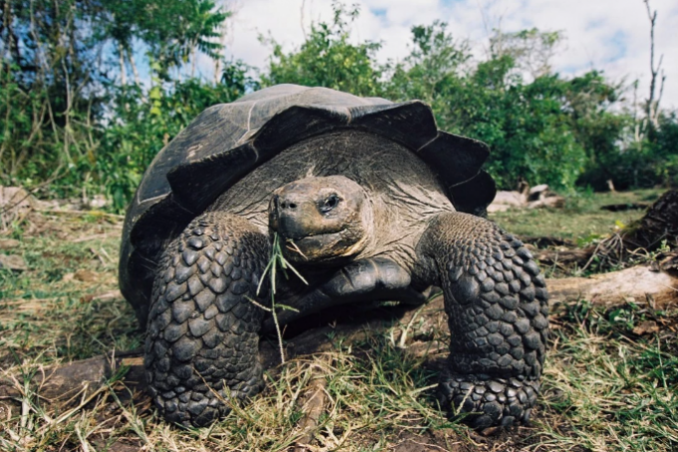Galápagos Islands: a cradle of evolution slated for extinction
Ecuadorian President Daniel Noboa approved a resolution to let the U.S. build military bases on the Galápagos Islands, 600 miles west of Ecuador’s coastline in the Pacific Ocean. The U.S. Armed Forces will arrive on Jan. 10 with ships, submarines, personnel, weapons and military equipment to control and patrol the region. The military base is exempt from paying the administrative taxes that other organizations must pay.
The U.S. government agreed that the stated objectives of the contract are to secure the Galápagos, combat drug trafficking and illegal fishing and prevent violent crimes between criminal groups.

The Galápagos Islands are named after the giant tortoises with the name, galápago (Spanish), that were once numerous on the islands. Credit: Uryadnikov Sergey/Adobe Stock
The history of U.S. military intervention and the so-called “War on Drugs” shows that these official objectives are a pretext to dominate South America, extend U.S. military presence in the South Pacific and minimize Ecuador’s sovereignty in the region — an issue in the upcoming Ecuadorian presidential election.
The base threatens to destroy the delicate environment of the Galápagos, which UNESCO declared a World Natural Heritage Site in 1978.
Ecuador’s left-wing former President Rafael Correa outlawed foreign military bases in Ecuador from 2007 to 2017. He expelled the last U.S. base in Manta in 2009, stating: “Galápagos is not an ‘aircraft carrier’ for gringo use. It is an Ecuadorian province, World Heritage Site, patriotic ground.”
However, U.S. imperialism is rapidly preparing for war with China. It controls 400 military bases and 300,000 troops encircling China in the Pacific region. That’s 60% of the U.S. Navy’s fleet. There are now 76 U.S. military bases in Central and South America, including in Argentina, Colombia, Panama and again in Ecuador today.
The importance of Galápagos
The fragile balance of the Galápagos ecosystem, rich seas and volcanic soils that have been conserved for generations is about to be destroyed with the arrival of the U.S. military. The construction of a military base and the presence of military equipment in the area could generate irreparable damage to this environment.
Animals and plants living on the Galápagos cannot be found anywhere else on earth. Giant tortoises, penguins, finches, hawks and iguanas — thousands of species — are unique to the 21 islands. Charles Darwin, the scientist who first proposed the theory of evolution in the 19th century, marveled at how such a rich collection of life could have gotten to the islands since they are over 600 miles west of Ecuador. He eventually realized that because the species were isolated from the mainland, they had developed genetic mutations independently over time that allowed them to survive on the rugged islands.
When Darwin studied the subtle differences between each species on the various islands, he realized they had developed recognizable differences based on their food sources and habitats. Variations were particularly clear when comparing the beaks of the Galápagos finches and how they related to the food sources on each island. This led to Darwin’s famous theory of evolution and publication of his book, “On the Origin of Species by Means of Natural Selection.”
The Charles Darwin Foundation, founded in 1959, leads efforts to conserve the islands. It protects 65,000 square miles of ocean around the islands. There are strict rules on the islands’ protected land that limit the impact of humans: Do not touch, collect or harass wildlife, stay on the trail with the guide, don’t leave trash and pay the entry fee to help with conservation.
Andres Arauz, 2023 vice presidential candidate for Correa’s party, Revolutionary and Democratic Ethical Green Movement (MOVER), previously Proud and Sovereign Homeland (PAIS Alliance), commented on the return of the U.S. military to the Galápagos: “I am hurt, because they want to turn an ecological paradise, a World Heritage Site, islands full of peace, into a brothel for U.S. Navy sailors and convert the economy of the islands to dependence on gringo military spending.
“I am hurt, because a gringo president who claims to be Ecuadorian [Daniel Noboa] has surrendered the sovereignty of my country. I am hurt, because he doesn’t care that our most precious paradise is a foreign military base to control the Pacific in the context of interstate war. To combat drug trafficking, warships are not needed.” (peoplesdispatch.org, Dec. 18, 2023)

